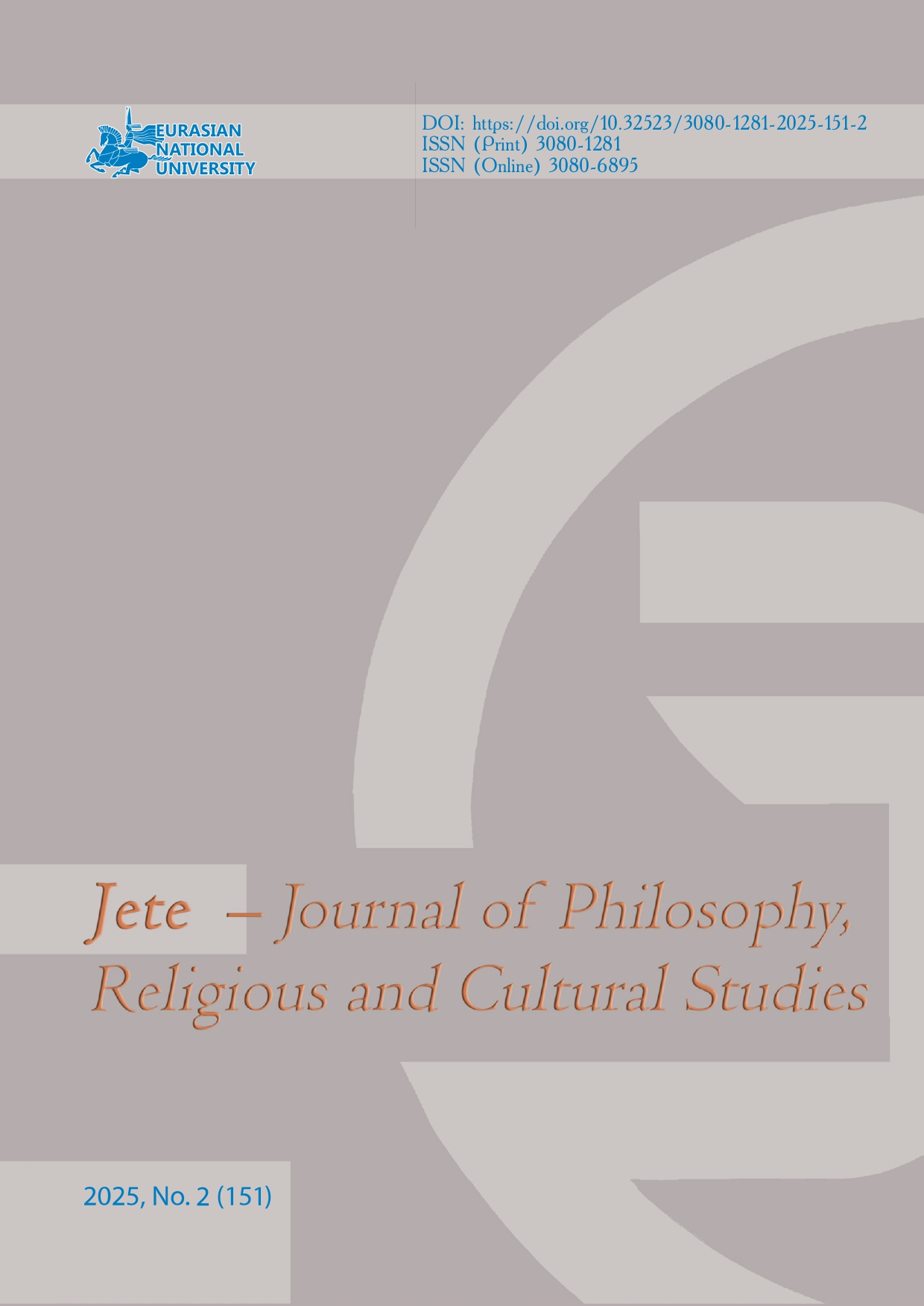Постпандемия кезеңіндегі Astana IT Университетінің студентжастары арасындағы демалыс практикаларының мәдениеті
Scientific article
Қаралымдар: 182 / PDF жүктеулері: 71DOI:
https://doi.org/10.32523/3080-1281-2025-151-2-196-213Кілт сөздер:
демалыс практикалары; студент-жастар; постпандемия кезеңі; цифрландыру; әлеуметтік оқшаулау; демалыс мәдениеті; коммуникацияның гибридті түрлеріАңдатпа
Мақала постпандемия кезеңіндегі студент-жастардың бос уақытын өткізу мәдениетіндегі өзгерістерді талдауға арналған. Жаһандық COVID-19 пандемиясы жағдайында студенттік өмір демалысты өткізуге, қарым-қатынас әдістеріне және әлеуметтік өзара әрекеттесуге әсер еткен елеулі өзгерістерге ұшырады. Жұмыста карантиндік шектеулер аяқталғаннан бері демалыс секторында пайда болған негізгі тенденциялар, сондай-ақ олардың пайда болуына ықпал ететін факторлар қарастырылған. Цифрлық технологиялардың ықпалына, коммуникацияның гибридті формаларына және студенттер арасындағы ойын-сауық, спорт және мәдени іс-шараларға қатысты басымдықтардың өзгеруіне ерекше назар аударылады. Авторлар әлеуметтік оқшауланудың және қашықтан білім берудің жастардың күнделікті тәжірибесіне әсерін зерттеп, олардың әлеуметтік байланыстарды қалпына келтіруге және мәдени практикалардың жаңа түрлерін іздеуге деген ұмтылысына назар аударады. Жүргізілген зерттеулер негізінде пандемиядан кейінгі бос уақыттың негізгі ерекшеліктері анықталып, өзгермелі әлеуметтік контексте студенттердің өмір сүру сапасын жақсарту бойынша ұсыныстар жасалды.
Downloads
Әдебиеттер тізімі
Bakhtin M.M. Tvorchestvo Fransua Rable i narodnaya kul'tura Srednevekov'ya i Renescansa [The Works of Francois Rabelais and the Folk Culture of the Middle Ages and the Renaissance]. Moscow: Art Literature, 1990 (1st ed. - 1965). 543 p. [In Russian].
Cacioppo, J. T., & Patrick, W. (2008). Loneliness: Human Nature and the Need for Social Connection. W.W. Norton & Company. URL: https://psycnet.apa.org/record/2008-07755-000 (accessed: 21.03.2023).
Dyumazed'ye, Zh. Na puti k tsivilizatsii dosuga [Towards a Civilization of Leisure]. Bulletin of Moscow State University, Series 12, Social and Political Research. - 1993. - No. 1. - P. 83-88. [In Russian].
From UN reports (2020). COVID-19 and young people: urgent action needed to stem ‘severe and long-lasting’ impacts. Human Rights 75 Initiative. URL: https://www.ohchr.org/en/stories/2020/08/covid-19-and-young-people-urgent-action-needed-stem-severe-and-long-lasting-impacts (accessed: 21.03.2023).
Garkusha, K. G. (2021). Tekhnologii organizatsii molodezhnogo dosuga [Technologies for organizing youth leisure]. URL: https://rep.ksu.kz/handle/data/13540 . (accessed: 22.01.2023). [In Russian].
Kawachi, I., & Berkman, L. F. (2001). Social ties and mental health. Journal of Urban Health, 78(3), 458-467. URL: https://pmc.ncbi.nlm.nih.gov/articles/PMC3455910/ (accessed: 21.03.2023).
Myrzabekova, A. A. (2017). Osobennosti dosugovykh praktik sovremennoy studencheskoy molodezhi [Features of leisure practices of modern student youth.]. KazU Khabarshysy. Psychology and Humanities Series, 58(3). URL: https://bulletin-psysoc.kaznu.kz/index.php/1-psy/article/view/662 . (accessed: 22.01.2023). [In Russian].
Oleshkevich K. I., Dmitriyeva Ye. Ye. Kul'turnyy dosug studentov v period pandemii COVID-19 [Cultural leisure of students during the COVID-19 pandemic]. Current research, 2021. - No. 7 (34). - P. 24-27. [In Russian].
Ozanov A.K. Dosug i issledovaniye dosugovykh praktik studentov [Leisure and the Study of Students' Leisure Practices]. Museum of Archeology of the RSE "Gylym Ordasy", Electronic scientific journal "edu.e-history.kz". 2017. No. 4 (12). URL: https://edu.e-history.kz/kz/publications/view/785 (accessed: 09.01.2023). [In Russian].
Primack, B. A., Shensa, A., Sidani, J. E., Whaite, E. O., Lin, L., Rosen, D., Radovic, A., Colditz, J. B., & Radovic, V. (2020). Social Media Use and Perceived Social Isolation Among Young Adults in the U.S. American Journal of Preventive Medicine, 53(1), 1-8. URL: https://pmc.ncbi.nlm.nih.gov/articles/PMC5722463/ (accessed: 21.03.2023).
Qiu, J., Shen, B., Zhao, M., Wang, Z., & Xie, B. (2020). A nationwide survey of psychological distress among Chinese people in the COVID-19 epidemic: Implications and policy recommendations. General Psychiatry, 33(2). URL: https://gpsych.bmj.com/content/33/2/e100213 (accessed: 21.03.2023).
Roshchina Ya.M. Differentsiatsiya stiley zhizni rossiyan v pole dosuga [Differentiation of lifestyles of Russians in the field of leisure]. Economic sociology. - 2007. - Vol. 8. - No. 4. - P. 23-42. [In Russian].
Rymkhanova, A. R., Abil'dina, S. K., Dyusembinova, R. K., & Ryskulova, A. A. (2021). Volonterskaya deyatel'nost' studencheskoy molodezhi kak sredstvo formirovaniya lichnostnykh i professional'nykh kachestv u budushchikh spetsialistov [Volunteer activities of student youth as a means of forming personal and professional qualities in future specialists]. Bulletin of Karaganda University. URL: https://rep.ksu.kz/handle/data/11199 . (accessed: 22.01.2023). [In Russian].
Saktapov A.K. Vliyaniye pandemii COVID-19 na obraz zhizni studentov i obrazovatel'nyy protsess [The impact of the COVID-19 pandemic on the lifestyle of students and the educational process]. Pharmaceutical Journal, 2023. - P. 189-196 URL:https://pharmkaz.kz/wp-content/uploads/2024/01/%D0%A1%D0%90%D0%9A%D0%A2%D0%90%D0%9F%D0%9E%D0%92.pdf . (accessed: 11.04.2024). [In Russian].
Shcherbakova, Ye. V., & Shcherbakova, T. N. (2020). Analiz dosugovoy deyatel'nosti studencheskoy molodezhi kak usloviye proyektirovaniya vospitatel'noy raboty v vuze [Analysis of leisure activities of student youth as a condition for designing educational work at the university]. "KANT" Journal, 1(34), 351. URL: https://stavrolit.ru/kant/1613/1684/stavrolit.ru . (accessed: 22.01.2023). [In Russian].
Strel'tsov, Yu.A. Kul'turologiya dosuga [Culturology of leisure]. Moscow: MGUKI, 2003, 297 p. [In Russian].
Vozmitel', A. A. Obraz zhizni: teoretiko-metodologicheskiye osnovy analiza [Lifestyle: Theoretical and Methodological Foundations of Analysis]. Sociological Research. - 2009. - No. 8. - P. 58-65. [In Russian].
Жүктеулер
Жарияланды
Журналдың саны
Бөлім
Лицензия
Авторлық құқық (c) 2025 Жанар Абильдинова, Еркин Аубакиров, Жазира Байсарина (Автор)

Бұл жұмыс Creative Commons Attribution-NonCommercial-NoDerivatives 4.0 Дүние жүзінде.












